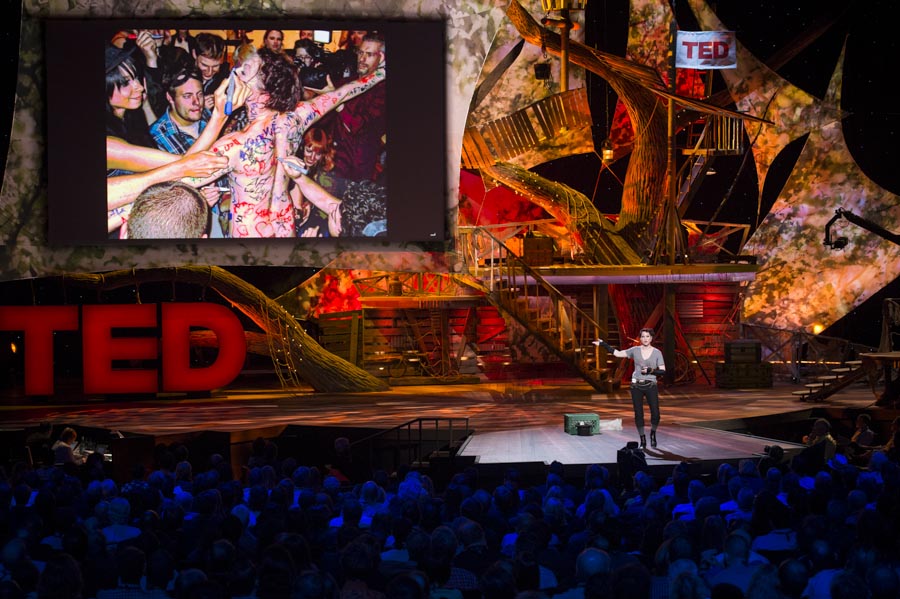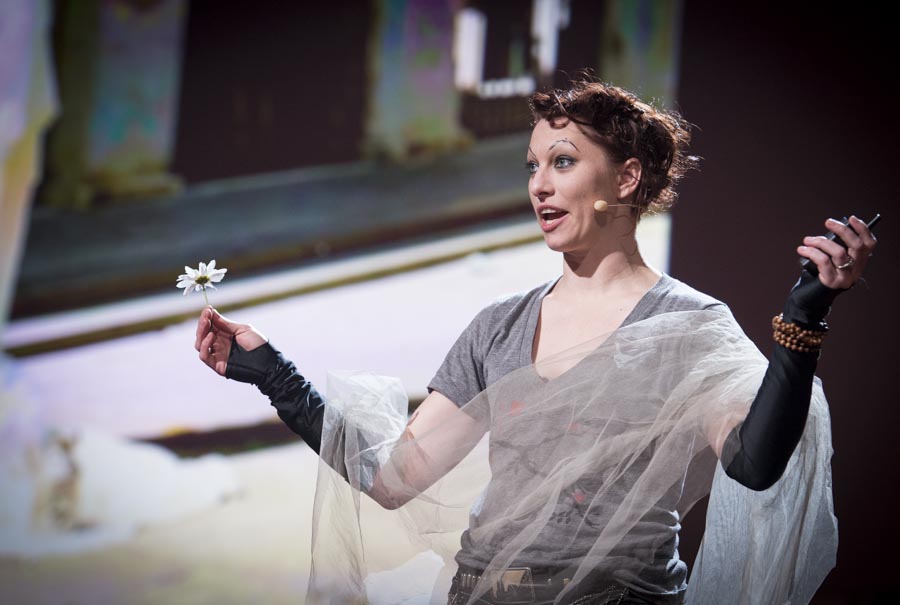
At the end of a Kickstarter backer party in Berlin, Amanda Palmer stripped and let everyone draw on her. “If you want to experience the visceral feeling of trusting strangers, I’d recommend this.” Photo: James Duncan Davidson
Amanda Fucking Palmer wants us to re-think how we think about paying for music.
She is known for her music, first as half of the Dresden Dolls, now as a solo artist. But for 5 years after graduating, Palmer made her living as a living statue called the Eight Foot Bride. (“Everyone always wanted to know, ‘Who are these people in real life?’ Hello!”) When a stranger gave her money, she gave them a flower and extreme eye contact. This allowed a remarkable connection with people — especially lonely people, who felt no one ever saw them. She was, of course, yelled at from passing cars: “Get a job!” As if what she was doing wasn’t real.
Palmer started making money from the Dresden Dolls, but didn’t want to lose that sense of contact. So they made an art of asking people to help out, in person. Then Twitter came along. She could ask for a piano to practice on, and be in a fan’s house in an hour — an experience that was great for her, and for the fan. Twitter helped her to connect to her fans, and her fans to connect to her.
One time she pulled up to a fan’s house, which turned out to be a family of undocumented immigrants, who gave them beds. She wondered if it was fair since those people had so little. In the morning, the mother pulled her away and said, “Your music has helped my daughter so much. Thank you for staying here.” There is a value to art, and that experience convinced Palmer it was fair to ask.
The Dresden Dolls signed with a major label and sold 25,000 copies of their much-anticipated second album. But 25K was considered a failure and the label walked away. Shortly after that, after a show someone came up to her and gave her a $10 bill and said, “I’m so sorry, I burned your CD from a friend, and I want to give you this money.”
Right then she decided to give her music away for free and ask fans for help. She got off the label and set up a Kickstarter. The goal was $100,000. By the end, she had recieved $1.2 million. It was the biggest music Kickstarter ever. And the number of backers? About 25,000. People ask her, “How did you make them give?” She replies, “I didn’t make them, I asked them.”
And she was criticized for it. On the tour, she asked local musicians to join her on stage in exchange for love and hugs, the same way she had before. Because of the fundraising, people reacted with something that made her feel the same as when people yelled, “Get a job!” She says the critics didn’t understand the nature of the transaction, “They weren’t with us on that sidewalk. They couldn’t see the exchange that was happening between us.”
 What she has built is trust in her fans. At the end of a Kickstarter backer party in Berlin she stripped and let everyone draw on her. (“If you want to experience the visceral feeling of trusting strangers, I’d recommend this.”) The point, though, is that for most of history, musicians were part of the community, not stars, not out of reach. Celebrity has changed this, but now the internet is changing it back. Says Palmer, “It’s about a few people loving you up close — and about those people being enough.”
What she has built is trust in her fans. At the end of a Kickstarter backer party in Berlin she stripped and let everyone draw on her. (“If you want to experience the visceral feeling of trusting strangers, I’d recommend this.”) The point, though, is that for most of history, musicians were part of the community, not stars, not out of reach. Celebrity has changed this, but now the internet is changing it back. Says Palmer, “It’s about a few people loving you up close — and about those people being enough.”
People are confused by how she sells with no hard sticker price. What they’re missing, she says, is that this is about trust. Online tools are making interaction easier and more effective, but, “The most perfect tools can’t help us if we’re not willing to face each other and give and receive fearlessly. And more importantly, to ask without shame … When we really see each other, we want to help each other.”
She thinks people have been asking the wrong question, “How do we make people pay for music?” What if instead we ask, “How do we let people pay for music?”
Performance
Later she took the stage again to play “Ukulele Anthem,” to a transfixed audience. Here’s what TED’s Music Director Bill Bragin had to say about what he was looking forward to from her:
“One of the things we’ll see is a celebration of the ukulele. And one of the key lines in her song is “stop pretending art is hard.” It’s a battle cry for people to participate in the arts. She’s someone who started her career as a street performer and she has learned to really grab people and pull them to her.”
Amanda Palmer’s talk is now available for viewing. Watch it on TED.com»
Comments (25)
Pingback: Jetpack solves everything - JuggedWyrm.com
Pingback: How do you finance artists by using social media and by directly connecting with the fans? A report from TED WEEK #UCLAAndersonTED | TED & UCLA ANDERSON 2013TED & UCLA ANDERSON 2013
Pingback: Great Ideas and the Ideas Industry @ Erinevad signaalid
Pingback: TEDxKyiv Live
Pingback: Amanda Palmer Gets Standing Ovation for TED Talk At TED2013 | GoodSeedPR.com
Pingback: I like Amanda Palmer | Libby Broadbent
Pingback: An explosion of interesting things | aaronscottkroh
Pingback: Cultures of New Media / Syllabus / spring ’13 | Kathi Inman Berens